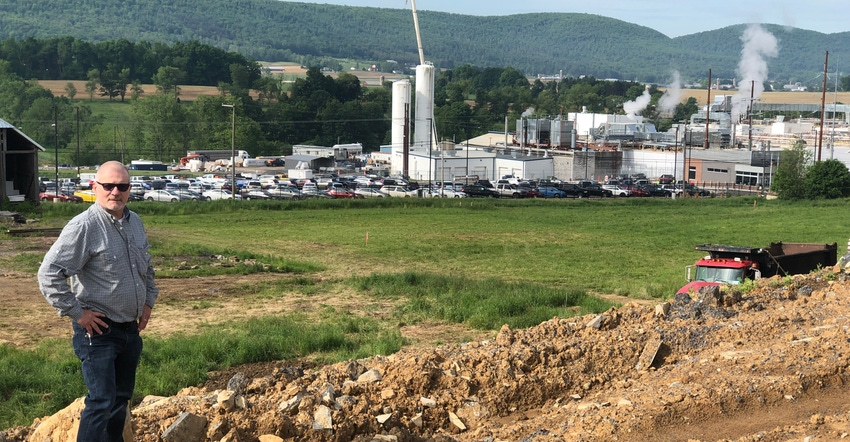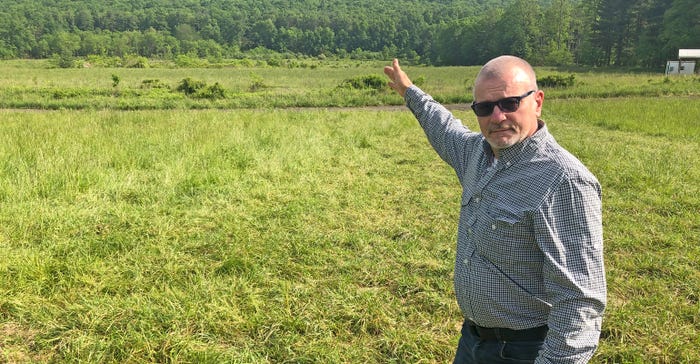
Between COVID-19, a recent hack of the JBS computer system, volatile pricing and calls for investigations into cattle market price imbalances, it’s been a tumultuous year for meat packers.
Nicholas Meats LLC, a relatively small but crucial player in the Northeast, has had its own share of issues. In February, the plant temporarily shut down over a disagreement with the state’s Department of Environmental Protection over its spreading of food processing residuals on farmland. Albeit temporary, it left many farms without a local outlet for their cattle.
But the plant’s owners are looking forward, recently breaking ground on a project that will be the first of its kind in the nation for a meat processing facility.
The company is building a $50 million Sustainable Resource Facility across the street from the plant that, when finished, will process the plant’s waste to generate energy for the plant, as well as a fertilizer source for local farms. Wastewater will also be reclaimed through a complex water filtration system.
The company says the facility, which will take two years to build, will help reduce the amount of food processing residuals being spread on farms, leading to less truck traffic and better odor mitigation.
“It’s been under consideration for about six years,” says Brian Miller, the company’s director of sustainability, who is overseeing the project’s development and will run the facility once it’s finished. “Pretty much anything that leaves this plant has a beneficial purpose. So the components of the cow are sold as either edible or nonedible products, and then the food processing residuals are allowed to be applied to fields because they have a beneficial use.”
But the spreading of these residuals — waste and wastewater from the washing down of animals and equipment in the processing plant — has led to problems with neighbors, who have complained about odors, and the state over the company’s spreading of these residuals on frozen ground even though it’s a fertilizer source for farms.
Miller says the new facility will process those residuals and recover 90% of the water from it.
The process
Liquid food processing residuals will be sent over to the treatment facility via underground pipes while solid wastes, also a byproduct of the slaughtering process, will be trucked over.
Two anaerobic digesters will process the solids while a separate digestate holding tank will be used to generate biogas to power hot-water boilers in the facility. The separated solids will be stored and be available as a fertilizer amendment for local farms.
The wastewater will be processed in a separate treatment facility that will go through several processes before generating a potable water that can be reused in the processing facility. Miller says the facility will be able to recover 90% of the wastewater from the processing plant.
He says the project went through many iterations before the company settled on Belgium-based Global Water and Energy as its partner. While waste-to-energy projects aren’t unique anymore, Miller says the facility’s two-stage reverse osmosis system, which will create the potable water, stands out.
“We had an aggressive plan to reuse that water, and we went and looked at some other plants and found that … what we could recover could be higher if we put some additional technology in,” he says.

FUTURE PLANS: The company’s Sustainable Resource Facility, which Brian Miller is overseeing, is the first of its kind for a meat processor. It’s being built on land across the street from the processing facility. At a cost of $50 million, it will take two years to build.
Unlike covered lagoon digesters seen on farms, the facility’s digesters will be complete tanks, enabling a mix that will be in constant suspension. Miller explains that this will maximize the breakdown of organic matter and maximize the creation of biogas.
To account for the land being used for the new facility, a separate 12-acre mitigation project is being installed off-site that will include a 12-acre riparian buffer consisting of 2,500 planted trees and a half-acre of wetland creation.
"This is a project that's been a long time coming, and I think once it's complete, it's going to bring many benefits to the community,” Miller says. “It's going to bring benefits to the company, and it's going to be, overall, environmentally beneficial.”
Small but important
About 600 head of cattle are processed a day at Nicholas Meats. That’s small compared to Cargill’s Wyalusing, Pa., plant and the JBS Souderton plant outside Philadelphia, which processes 2,500 head a day.
But Nicholas Meats has made a name for itself as an out for small, regional farmers. It specializes in organic and grass-fed animals, and has buyers who purchase animals across the Northeast, the Midwest and Canada. But it also takes in cull animals from local farms that don’t even need an appointment.
“One of the benefits we have is we are small, and we are a regional supplier,” Miller says. “You’re going to see a lot of the processing companies go to a more regional model in the future.”
About the Author(s)
You May Also Like






